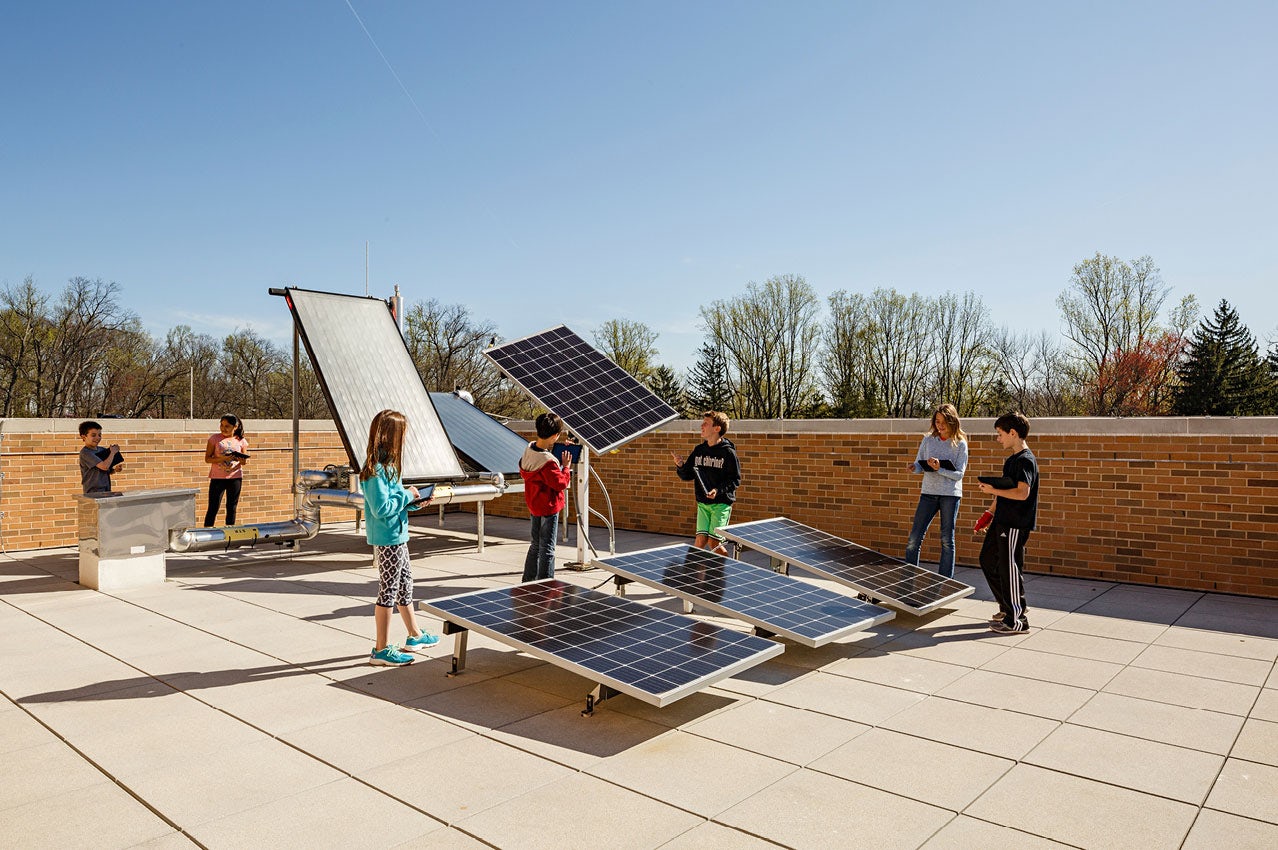A 2017 AIA Committee on the Environment “Top Ten” recipient, Discovery Elementary School has received Zero Energy certification from the International Living Future Institute (ILFI). Discovery is the first verified Zero Energy (ZE) building certified by the collaborative partnership of the ILFI and New Buildings Institute (NBI). These organizations oversee certification and data collection—creating a seamless system for tracking, registering, certifying, and evaluating ZE buildings. Discovery is one of only four schools nationally and the largest building of any kind, anywhere in the world to receive ZE certification by the ILFI and NBI.
ZE certification is not merely theoretical, but is based on actual, observed evidence. As described by Arlington Public Schools in a recent press release: "much of this evidence comes from the state-of-the-art Discovery Dashboard, providing quantitative data and analytics not only to organizations like ILFI, but also to the entirety of the general public, and—most importantly—the students at Discovery, serving as an authentic learning platform, used in teaching mathematics, pattern recognition, data analysis, scientific principles, sustainability habits, and more."
Arlington Public Schools Sets the Bar
Discovery is Arlington Public Schools’ first elementary school designed in the 21st century. Throughout a series of intensive community planning meetings, careful attention was focused on designing and building a school that supports how and where students learn. Every nook and cranny of the school is arranged to create a seamless integration between design, sustainability, and learning. The school’s ZE design results in $117,000 of annual utility cost savings in comparison to a typical APS elementary school of the same size—enough to cover the salaries of two teachers! The project was completed under budget, allowing the school district to apply $2,900,000 to other projects. Further, the building is operating more efficiently than designed, at an actual energy use intensity (EUI) of 15.8 KBTU/sf/year. During 2017, Discovery produced more energy than it used—sending a surplus of 100,000 kWh to the grid, which is enough to power 7.5 average Virginia homes for an entire year.
Accelerating ZE through Sustainable Design Partnerships
In fall 2016, the Department of Energy’s Better Buildings Initiative launched its Zero Energy Schools Accelerator in conjunction with a tour of Discovery. The Accelerator program seeks to make ZE schools more mainstream by demonstrating how investing in renewable energy translates into cost savings and enhanced learning environments. Initially, the DOE partnered with Arlington Public Schools (APS) and five other school districts to develop ZE plans. In 2017, APS included ZE design as a requirement in new construction procurement. Later that year, Arlington County earned the nation’s first LEED for Communities Platinum certification from the U.S. Green Building Council (USGBC).
School as a Teaching Tool
As technology coach Keith Reeves puts it, “Discovery isn’t just a school building. Every aspect of the environment is built for and used for learning. It’s a school that’s not just for children, but of children, and a lot of that has to do with the way the building was built. We aspire to its example, and strive to implement innovative, research-based, future-proof practices that mirror the potential of this space.”
Like its name suggests, Discovery provides hands-on learning opportunities that encourage students to take ownership of their sustainable school and contribute to its zero energy culture. Certified LEED Gold by the USGBC, Discovery received 6 Innovation in Design credits including the difficult-to-obtain School as a Teaching Tool credit. To foster a culture of stewardship and accountability, sustainable features such as the photovoltaic array are made visible and accessible through learning opportunities such as a rooftop solar lab. Data from the adjustable solar lab is fed into the school’s building energy dashboard, allowing students to conduct experiments with real-time data. The building’s energy data can be tracked hourly, daily, monthly, and yearly, and is publicly available for use—prompting the school community to engage, question, and become active participants in their school as a teaching tool.
For media inquiries, please contact Mary Beth Lineberry, Director of Marketing, at lineberry@vmdo.com.

